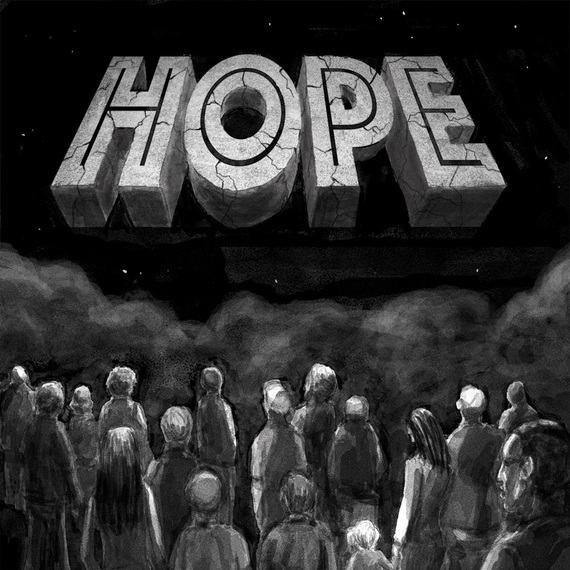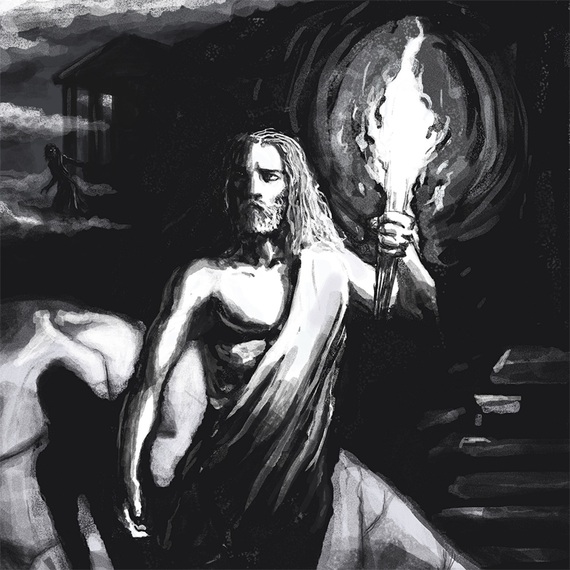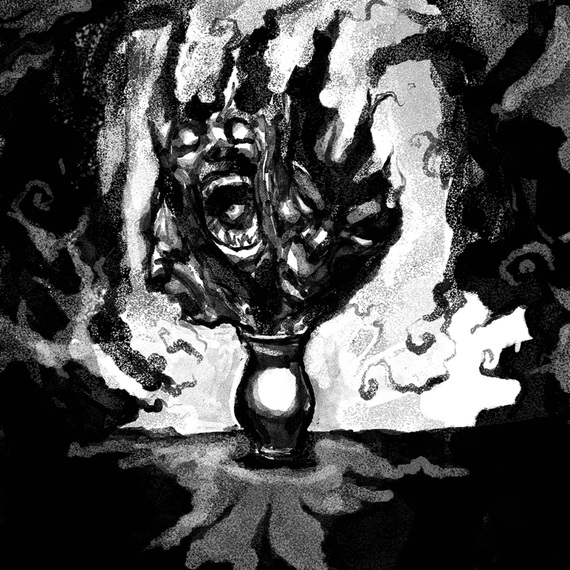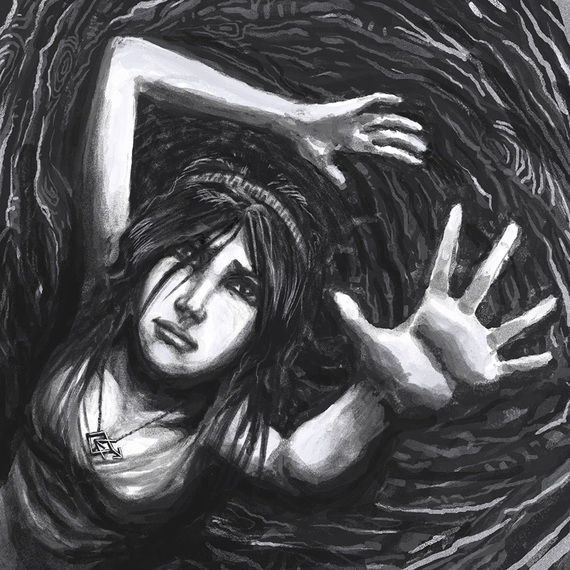Americans just dedicated an entire month to exchanging gift-wrapped boxes with family and friends. When the bows came off the well-intentioned presents, some of them were treasured, and some were tossed into the forgotten corners of a dark closet. Busy lives promptly resumed. How many people paused to think about whether their loved ones got what they really wanted?
The hope that grandma would finally accept her gay grandson. The hope for that budding Tinder relationship to last through Valentine's Day. The hope that next year daddy would be there to decorate the tree instead of behind bars staring at the ceiling. The hope that a deranged member of ISIS or a pathologically lonely teenager would not shoot up the movie theater during the family screening of The Force Awakens. Or did these inner yearnings become stoic new year's resolutions? The 15 pounds to lose. The job to find that will bring greater security and opportunity. The hope that this year is the year that we will change for the better and finally accomplish those goals we've been putting off and achieve some hard-earned success.
We are entering the most hopeful time of year; a time when goals, dreams and vision matter. It's the time when new beginnings - or at least the idea of them - have us feeling inspired and motivated. Hope matters deeply to us as a culture and we have made it one of our most treasured virtues. But if you look closely, you might see that we often value the hope we feel more than we value the pursuit of goals, more than accomplishment, and more than the actual change that comes through hard work. To put so much value on hope, some might say, is a very dangerous proposition.
Do we fully understand hope and its value? Have we ever taken a close look at when hope might be, dare I say, harmful?
According to the Merriam-Webster dictionary, to hope is to cherish a desire with anticipation, or to expect with confidence. Quite simply, hope is positive expectation for an anticipated future. Yet expectation can also be negative, which would be called fear, despair or hopelessness. And it is this dynamic relationship at the root of expectation between hope and fear that is so important for us to investigate.
We value hope because life is challenging, even downright unfair and painful at times, and it is our nature to want to better our situations. It is virtually impossible to go through our days without experiencing or witnessing incredible degrees of suffering and illogical injustice. These are moments where hope is needed, because sometimes it is hard to put one foot in front of the other. Sometimes, hope is all a person has on a dark and dismal day.
There is also another side to hope, and it is one that many of us do not recognize because we aren't taught about it, and if we were, it would reveal the fragility of our realities and the temperamental nature of desire. Yet if we do not have this critical analysis of hope, we may move into the future with a rather large and vulnerable cultural blind spot.
Look closely. Hope for a better outcome tempers a dissatisfying present with the assuredness that one day we will build a better world, that we will write that book that gathers dust in the reaches of our mind, or that our children will be kind to transgender people. Hope influences us to expect the United Nations to bring solutions to the escalating dangers of climate change, or that our elected politicians will create legislation that will support the rights of many and bring justice to those who deserve consequence for their crimes.
Will they actually do such a thing? Beyond making us feel a bit better with their promises in the moment, what does that kind of hope really do about climate change or gender equality?
In 2008, then-candidate Barack Obama galvanized millions with hope and promises of change. His message rallied many that hope-inspired action could reconcile the wrongs of the past, and that the insurmountable problems of the present would bend toward the long arc of justice. And he became the President. However, while hopeful expectations were set in the hearts of many, a blowback of fearful expectations were inspired at a mass level as well - and that fear galvanized the creation of the Tea Party and is now powering the candidacy of Donald Trump.
Look closely again. Look fearlessly around you at the billboards, the commercials, the street names, the film trailers and the motifs of our time. Hope is more than a need, it has become a drug. It is used in politics, media and advertising to do more than inspire us. It is used to manipulate, and sometimes it even controls us.
When I started this investigation around the true nature and value of hope for my upcoming musical project Elpis, I had media professionals, advertising executives, and a political spinster tell me: "Be careful. You are bringing up a dangerous question. The powers-that-be do not want our society to open this Pandora's Box."
A psychologist said: "You are about to reveal the sacred cow of manipulation. Think twice."
I did think twice about it. And I ultimately decided that if it's so dangerous to question the role of hope in our society, then it's imperative to do it. After all, we are at a serious crossroads, are we not?
In pursuit of a more authentic and balanced understanding of hope, my seeking led me to a place where few of us go anymore, beyond the quick clicks of our social media feeds filled with the latest headlines, to timeless human history.
I discovered the little-known character of Elpis in the well-known ancient Greek myth about Pandora's Box. Her legacy was buried and had not yet made it into our mainstream media, but when I found her, I knew that she is a vital part of the story. I knew I had to aid her escape; that if I could bring her to life through the sound of my viola she could carry a transformative message to those willing to listen.
On this eve of 2016, at the start of new beginnings, I'd like to share with you the backstory of Elpis, accompanied by my score of that backstory, the first song of the album, entitled "Prologue". My goal is that Elpis may spark your curiosity as she did mine, and you will join me in conversation and within your own community about the role hope plays in our lives and actions. I know it is just a catalyst to major shifts we must consider, but the process of reconciling reality with our ideals is an important and thoughtful place to begin.
In Greek mythology, men and gods were created equal. Prometheus, the Titan who believed in mankind the most, was our devoted champion. He taught us to read and write, how to use arithmetic, how to build and create. Zeus, on the other hand, did not appreciate us in the same way, and wanted to reign supreme over mankind. Zeus would subversively work to get mankind to worship him, and had a tense relationship with Prometheus, who Zeus perceived to be a trickster bestowing unmerited advantageous gifts upon mankind.
So when Prometheus stole fire from Mount Olympus and gave it to man, Zeus took action. A threatened Zeus cast a great curse on Prometheus, his family, and all of mankind. Prometheus' torturous punishment was to be tied to a rock where an eagle devoured his liver each day, only to have it grow back the next day, when the eagle would begin again.
Zeus turned his attention next to man, and said said something haunting, complex and deeply important:
"I will give men as the price for fire an evil thing, in which they may all be glad of heart while they embrace their own destruction."
~ excerpt from Hesiod's Work and Days, II. 54-59.
He gave instruction to have Pandora created as the first woman, and positioned her to fall in love with Prometheus' brother Epimetheus. As a wedding gift, he prepared a beautiful box with undisclosed contents and advised Pandora that she must never open this mysterious box, knowing she would not be able to resist. Inside the box were many evils and one of them was Elpis, the spirit of hope, which translates to expectation. Because Elpis was so heavy and grievous, when Pandora opened the lid, all of the other evils quickly flew out into the world and Elpis lay stuck at the bottom.
Pandora immediately realized her error and with haste put the lid back on before Elpis had a chance to fly out of the container. There Elpis met her fate, and has been trapped in Pandora's Box all these millennia... waiting, waiting, waiting to be rescued.
Waiting. For Zeus, for Pandora, for someone else to save her.
The Elpis character fascinates me. The interpretation is fluid and changes, but one thing is clear: Elpis, unexpectedly trapped in her prison, waits for her salvation and for her freedom. And while she waits and hopes for another to rescue her, nothing about her world changes.
Like Elpis, we see this hopeful state paralyze us regularly, while nothing about our world changes - or at least not as we hoped it would.
Do you know a woman who stayed with an abusive man, because she dearly hoped that he would eventually change? He didn't change. As time went on, her confidence, her sense of self, and her willingness to leave and build a better life faded. Her hope did not help her situation, it was not empowering behavior, and it dimmed her spirit.
Have you ever had a professional colleague promise you something big, and as a result you handed them the keys and waited for them to deliver, with the hope that they would bring you the client or collaborator that would change your business around, or that raise or promotion that would take you to the next level? After all that time and investment, what you hoped for didn't come to you. That's a hope that doesn't help, and a process where one looks outside of themselves for the solution.
Hope is not belief; it is neither trust nor faith. It is not the confidence that a course of action should bring forward an intended outcome. Hope is the expectation of receiving something positive.
The critical concern is that hope can feel so good and reassuring, and in that state we see only what we want to see. As a result we can wait, or watch or even act without full awareness of limitations and facts, therefore obscuring our judgment about a situation. Hope is so emotionally seductive, we can be manipulated on mass levels when hope is dangled in front of our minds and hearts, and repeated across messages and media. And hope can transform to fear in oneself, or your hope can inspire someone else's fear very quickly depending on how reality unfolds and either reinforces or contradicts our expectations about the future.
Generations have both struggled with hope and turned to hope in trying times. It's now time to ask what kind of modern mythology we're creating around hope and at what consequence, so that we may start understanding that we have a choice as to how the dualism of expectation, and the interplay of hope and fear, impacts us personally and as a society.
Throughout 2016 we are going to experience, observe and analyze the spectrum of hope, expectation and the story of Elpis in their complex glory. To be a part of the conversation, follow me on Facebook, Twitter or Instagram, or sign up for email alerts at www.christenlien.com. Also, watch my recent performance at TEDxBoulder: Empathy and Malice to see more of my work.
Artwork by Bill Nelson.
For further reading and viewing:
Man's Search for Meaning (by Victor Frankl)
Beyond Hope (by Derrick Jensen)
The Century of the Self (by Adam Curtis)
The Psychology of Hope (by Charles R. Snyder)
The Sufficiency of Hope (by James Muyskens)
The Theology of Hope (by Jurgan Moltmann)




